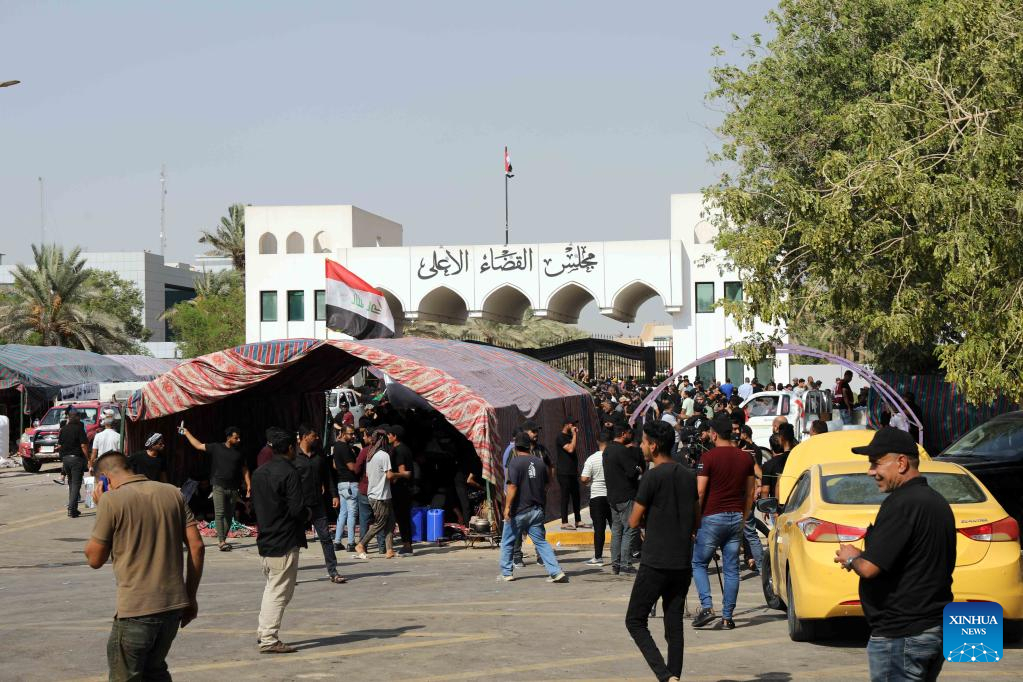
People rally for a protest in front of the gate of the Supreme Judicial Council in Baghdad, Iraq on Aug. 23, 2022.
Hundreds of Shiite cleric Moqtada al-Sadr's supporters on Tuesday began a sit-in protest in front of the gate of the Supreme Judicial Council (SJC) in Baghdad, demanding a decision to dissolve the parliament.
The latest sit-in came as the political disputes have escalated in the past weeks between al-Sadr and his rival Shiite parties in the Coordination Framework (CF), an umbrella group of Shiite parliamentary parties. (Xinhua/Khalil Dawood)
BAGHDAD, Aug. 23 (Xinhua) -- Supporters of Iraqi Shiite cleric Moqtada al-Sadr on Tuesday ended their one-day protest outside the compound of the Iraqi Supreme Judicial Council (SJC) in Baghdad demanding the dissolution of parliament.
A statement by al-Sadr's aide Mohammed Salih al-Iraqi said that the sit-in was to "encourage the SJC to hold the corrupt accountable, but to avoid bringing harm to the people, we advise the protesters to withdraw."
As the protesters withdrew from their sit-in site, the SJC said in a statement that it would resume its activities on Wednesday morning.
Earlier in the day, hundreds of al-Sadr supporters set up dozens of tents to begin a sit-in protest in front of the SJC compound and sent threatening messages to the council in an attempt to pressure the federal court into dissolving the parliament to hold new parliamentary elections.
The suspension of the SJC prompted Iraqi caretaker Prime Minister Mustafa al-Kadhimi to cut short his trip in Egypt for a five-way Arab summit.
Al-Kadhimi, also commander-in-chief of the Iraqi forces, returned to Baghdad to directly supervise the security forces protecting judicial institutions, according to a statement issued by his media office.
"Disrupting the work of the judicial institution exposes the country to real risks," he warned, calling for an immediate meeting of political leaders to activate a national dialogue to defuse the crisis.
Iraqi President Barham Salih said in a statement that "the country's developments require everyone to remain calm and give priority to dialogue so that the country does not slip into unknown and dangerous mazes in which everyone loses."
He said that disrupting the work of the judicial institution "is a serious matter that threatens the country."
For his part, Iraqi Parliament Speaker Mohammed al-Halbousi said in a statement that "we must all resort to the constitution and be at the level of responsibility to get the country out of this suffocating crisis that may lead to the illegality of the political process."
The latest sit-in came as the political disputes have escalated in the past weeks between al-Sadr and his rival Shiite parties in the Coordination Framework (CF), an umbrella group of Shiite parliamentary parties.
On July 30, al-Sadr's followers broke into the heavily fortified Green Zone in central Baghdad and held an open sit-in in and outside the parliament building, demanding the dissolution of the parliament and early elections, all rejected by the CF parties.
The CF became the largest alliance in the Iraqi parliament after al-Sadr ordered his followers in the Sadrist Movement, the biggest winner of the Oct. 2021 elections with 73 seats, to withdraw from the parliament.
During the past months, the continued disputes among the Shiite parties have hampered the formation of a new Iraqi government, making it unable to elect a new president by a two-thirds majority of the 329-seat parliament under the constitution.
If elected, the president will appoint the prime minister nominated by the largest alliance in the parliament, now the CF, to form a new government that would rule the country for the next four years. ■



